Prepping isn’t all about being ready to grab your goods and run for the hills at a moment’s notice.
Readiness and preparation also mean protecting your valuables, supplies, and gear from thieves both before and after SHTF events; your sweet preps do you no good if they get carted off by some burglars!
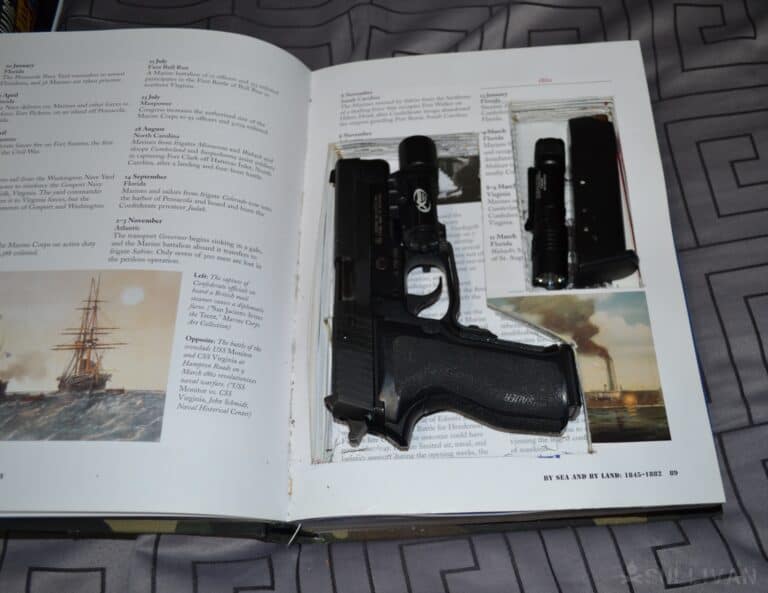
The obvious solutions are maintaining a low profile and investing in safes for your “serious” valuables like guns, jewelry, precious metals, and important documents but just like everything else a binary approach may not be best.
Instead of an “all or nothing” solution layering your defenses might be a better idea, at least for certain items. This is where the concept of diversion safes comes in.
Table of Contents
What is a Diversion Safe?
Diversion safes are simply containers, either designed or repurposed, for concealing items in plain sight disguised as something else, most often something that no self-respecting thief would nab.
From the simple to the borderline crazy, diversion safes are a great choice for keeping your gear and your valuables out of criminal hands. In this article, we’ll be looking into the cloak-and-dagger application of these hidden-in-plain-sight safes.
Asset Protection Methodology
Any resource or item you own must be protected through a combination of physical security, deterrence, and interdiction, i.e. a defensive response. Lacking any one element, your chances of losing valuables go up.
The problem for 99% of us is that we don’t have the resources to maintain truly comprehensive protection of our assets 24/7, be it financial, manpower, or otherwise.
So, we end up compromising. We count on being home to repel would-be burglars and home invaders. We modify our landscape and install lighting and other security measures to make our dwelling less attractive to thieves.
And, of course, we lock our goodies in a variety of safes, strongboxes, containers, and cases to, hopefully, keep them from being stolen when all else fails.
For the latter security element, safes, along with all physical security measures only serve to buy time: no safe, no matter how strong, will keep a determined attacker out of it forever. Any material can be breached and any fortification can be overrun.
But it is through increasing our burglars’ time on the “job site” that we hope a safe will convince them to give up and move on or just go look for greener pastures.
If there is one thing any crook wants to avoid, it is getting caught. Time spent loitering and looting is not time spent getting away with said loot, and that makes them nervous.
The problem is that crooks may not be worried about getting caught. If your house has been targeted they may be convinced of their safety and security on the job.
If they have done their advance work and know you are going to be away for some time, have been away for some time, or that your house is not readily observable, they may take the time to breach the safe or strongbox using tools they brought along for the task, or using your tools you just so happen to keep laying about in your garage…
Virtually any safe and all strongboxes or lockers must be sited properly and then bolted to a structural member of the building to be considered secure (for their given class of security).
Even then the smaller units are always vulnerable to being pried or cut away, carted off, and opened at leisure at a place of the crook’s choosing.
You might be surprised to know that larger safes, certainly anything below 500lbs or so, are considered man-portable by thieves. Using a truck or van and a little muscle they will do the same to your big, nice gun safe as they do the flimsy firebox from the office supply store.
It is shocking to hear, but it is true. While often a good solution for security, large, sturdy safes are not infallible.
Look at it from the burglars’ perspective: you just know that there is something good in there with your name on it. If they have some time and opportunity, why not try to get away or get into the safe and get the goodies? Forget the rest.
Another Option: Enter the Diversion Safe
Considering the totality of asset security, a true solution may feel more like chance than any achievable solution, like a knot that you cannot untangle. As with any intricate and tricky knot you need untangled, the answer is to cut it.
Applying that disruptive wisdom to the problem of keeping your preps, gear, and valuable assets safe from burglars, the equivalent is making sure that burglars don’t even know it is there to begin with!
Keeping a low profile and employing good procedures to prevent social engineering and other information gathering that leads to your house being targeted by thieves is one part, but the other subject of our article is the utilization of alternate hiding places, specifically diversion safes, themselves a refined form of deceptive mimicry.
A diversion safe is any container that has either been repurposed to hide something in an unconventional way somewhere in your house, or a purpose-made decoy, an item or fixture that appears to be something else but is actually a safe.
Diversion safes have a long and storied history, having been used all over the world by everyday people, spies, crooks, and others in pursuit of keeping what’s theirs, theirs!
From the fake can of shaving cream in intricately constructed and blended shelves, vents, and other household fixtures, there is a diversion safe available for any application and nearly any size of an item.
Even better, if you have a special requirement that is not commercially available, you can make your own of just about anything with a little imagination and know-how. The sky is the limit on diversion safe application!
In the following sections, we’ll discuss diversion safe theory as well as choosing the right one for your needs, and also some examples of commercial and DIY diversion safes. Put on your best spy gear and let’s get sneaky.
Making Diversion Safes Work
For diversion safes to work there are two essential elements you must take care of: fidelity and location.
Fidelity in this case means realism, as a shoddy diversion safe or one that is poorly integrated with its environment will attract attention and attention from a burglar means it is history most times.
Choosing a location depends on what you are stashing, how quickly you must access it, and other factors. Both of these elements are essential for the effective employment of a diversion safe, as with any decoy.
They are linked, two sides of the same coin: the most realistic and convincing can safe in the world will look suspicious if poorly placed, and likewise the best emplacement means little if the safe looks fake or “off” somehow.
Nailing both of these elements in tandem will truly bamboozle all but the most thorough or expert burglars, appearing to be the “real deal” and not worth the time to even touch.
A diversion safe that closely mimics other, authentic items in size, color, texture, weathering, and even heft in some cases will make all the difference in getting a positive outcome.
You should take care that your diversion safe does not develop unnatural wear, smudges, and other traces that could tip off an eagle-eyed burglar to the presence of loot behind a false front, just like the drag marks on the floor of the old castle that betray the hidden passage behind the bookshelf!
There is also a bit of “red teaming” you should do when considering the employment of a diversion.
What are they looking for? Where do they look? What are they expecting to see? What constitutes a “score” for them? Drill down; really try to get into their head.
For instance, amateur and professional thieves always (rightly) assume that the majority of valuables in a house are located in or just off the master bedroom, the “keep” as it were. That’s where they’ll find jewelry, cash, lockboxes, guns and gun safes, gold, silver, and more.
Anything you use to try hiding valuables in the bedroom will be subject to a higher level of scrutiny as a matter of course.
Compare to one that is parked in your pantry, disguised as a cereal box among other boxes, or a false-bottomed mantle over the fireplace.
Another option that goes a little deeper into the rabbit hole is protecting a “genuine” diversion safe with another, obvious diversion “safe” full of sacrificial goods, or even with a proper decoy safe or lockbox.
A diversion safe table leg containing gold that is buffered by a poorly hidden strongbox just under the tabletop (and full of useless but jangly metal bits suggesting gold or jewelry) is much more likely to survive a raid since the thief may very well say “jackpot” and get while the getting is good.
Clever Diversion Safe Ideas
The following list represents just a few potential diversion safes that you can employ to keep your goods securely in your possession.
I have presented a few additional considerations with each of them, as well as any potential drawbacks you might consider.
Movie Rack Misdirection
If you own a collection of movies in the form of a big shelf of Blu-Rays, DVDs, or, heck, even VHS tapes, it is an easy thing to turn one or two empty cases into a nice stash for cash and other small, sensitive goods.
All you’ll need to do is insert your goods into the case, close it up, and place it on the shelf among all the others. Hidden in plain sight!
A more elaborate version of this trick relies on making a thin, false panel that rests in the back of the case, an especially good trick for the larger multi-disc cases.
A thin piece of craft foam is all you’ll need. Just make sure the dimensions work for your case, and that the foam is big enough to completely cover the item you’re hiding.
Handle Hidey Hole
The amount of tools in the average home is startling, and I am not talking mechanics’ stuff. I mean things like brushes, brooms, rollers, mops, and so forth.
Many of these simple contrivances have hollow plastic or metal handles that can be accessed to stash cash, documents, memory cards, and other tiny valuables in as a hedge against loss or theft.
Even wooden-handled tools can, with access to a lathe or with hand tools and a ton of patience, hollowed out and made to serve as some of the most discreet concealments for your small goodies.
As with most things on this list, there is a sizeable catalog of ready-made and purpose-manufactured items to be had right now for those who have an abundance of cash but a shortage of patience or creativity.
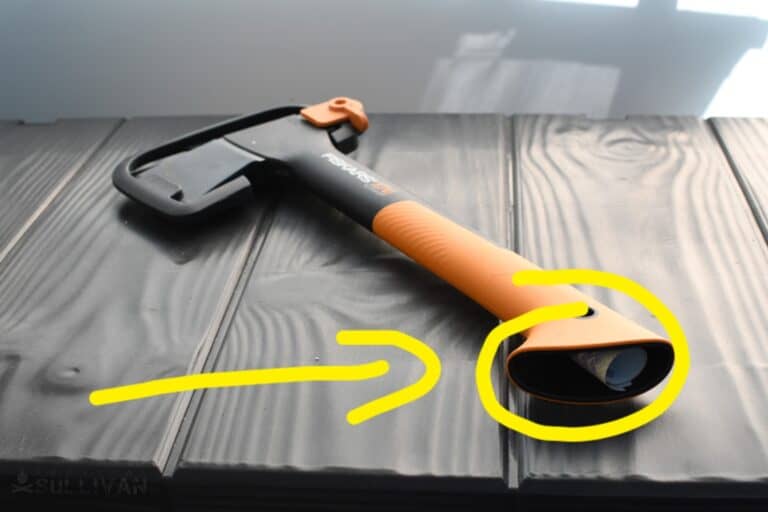
Any and all of them can work in the right setting, but you must make sure your chosen tool fits its environment and is also not likely to be picked up or used by thieves or any family members.
Think twice before choosing a hammer or hatchet in the case of the former, and perhaps a hairbrush or broom in the case of the latter.
No matter what you choose though, a little forethought can see these work in almost any setting. Just don’t forget you have something in there!
Paint Bucket Bamboozle
A 5-gallon paint bucket with lid makes a great container since they are nominally watertight, sturdy, easy to transport and with a little ingenuity can be made to fit into most environments.
The key to making these things practically invisible is to pump up the realism on them. Start with a clean, new bucket. Now seal it with its mating lid and rough it up really good. Dings, dents, scratches, the works.
We want to weather it so it does not look like a conspicuous and shiny bucket sitting suspiciously around somewhere. Next splash, drip and drizzle one or two colors of paint on the sides and a few drops on the lid.
Let these dry totally for a few days, and then it is time to “wash” the bucket. Use dirty water or even thinned coffee to seriously age your paint bucket.
At this point, after all this weathering and distressing, it should look like you need a new one. Perfect!
Stash your nasty bucket anywhere in a closet where you keep other tools or home improvement stuff, and complete the effect by laying some nasty, nappy roller covers in an equally old, cruddy paint try on top.
No one will look at it twice.
Laundry Day Diversion
If there is one place everyone avoids, it is a dirty laundry hamper, especially one topped with soiled clothes!
Take advantage of the tendency of people to avoid gribbly things at all times by keeping ready or making a decoy laundry basket full of dirty clothes.
This is a good one to use if you are in and out regularly but live alone since you will not have to worry about a well-intentioned guest or relative trying to actually do the laundry and discover your cash, or whatever else you want to hide in there!
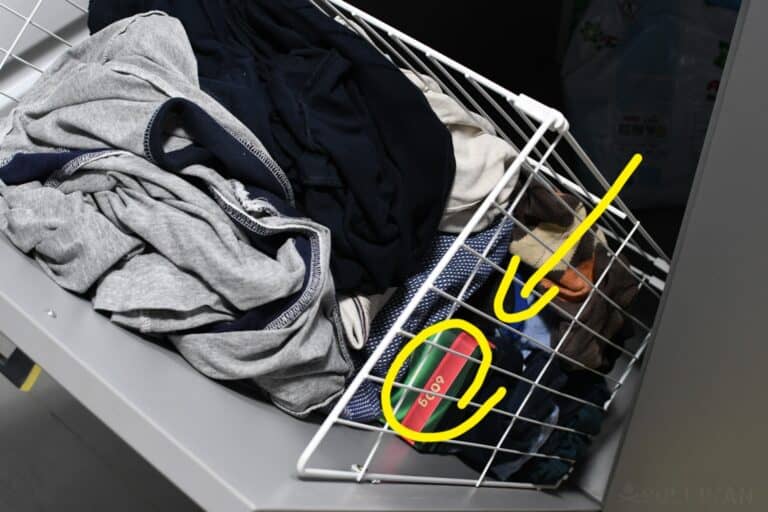
Making and employing this one is a cinch. Simply fill up a laundry hamper about halfway with clothing, and then emplace your goods. Use a big zipper bag or other flat container to keep your items from migrating if the basket is moved.
Pile on more clothing, then the finishing touch: drop some stinky, nasty sweaty clothes on top, or some dirty underwear. Hey, all’s fair in the protection game!
Treasure in the Trash
If there is one place in your home that almost anyone will be conditioned to stay out of, it is the trash can! No one wants to go rooting around in the trash for any reason, no matter what might be hidden inside that is valuable, thieves included.
And consider it from the thieves’ perspective: what kind of lunatic would hide their valuables in the trash?!
You can make your trashcan and/or trash pile do double duty in a couple of ways…
The first is by making use of the can itself, either by installing a false bottom compartment in the can or, in the case of modern lever-opening models operated by foot, making use of their dead space under the bottom to conceal small items.
Going with either of these two methods means you’ll need to take pains to ensure wet, sticky, filthy, and disgusting refuse and residue from your actual table scraps and garbage cannot reach and contaminate your items. Especially a dirty diaper, eh?!
The second way is to make use of “plain sight” bulky garbage like bags of trash and boxes, especially pizza boxes, piled near the can or backdoor, wherever, to conceal your valuables.
Anything that is weathered, grease-stained and the like will work best, but plain boxes work okay too. You can use bags of old clothes with some clean plastic bottles and newspaper inside to get the appropriate “loft” and weight for decoy trash bags.
Obviously, you will also need to take pains that your valuables don’t literally go out with the trash!
Pantry Protective Measures
The pantry is a great place to hide your valuables in any number of ways. Yes, there is a chance some brazen thieves will help themselves to your food as well as your valuables but most of them want to get in and out as soon as possible.
You can try a couple of things in the pantry, all of them food and drink related.
You can get false canned goods that have screw-off bottoms, perfect for hiding smaller valuables, everything from soup, beans, and veggies to another longtime prepper favorite, Spam!
False or repurposed canned food, jars, and the like are also great inclusions. Simply open the can and empty the contents before cleaning and then padding the interior to prevent rattling.
A “clean cut” can opener is ideal for this purpose since it keeps the lid intact for reattachment. If using a jar, make sure to use an old lid or one you can cut off so it will still fit snugly on the jar.
A simple coffee can, with a false bottom, makes a great secret safe. The false bottom can be made from almost anything: a piece of metal, cardboard or even wood.
Just make sure it’s sturdy enough to hold whatever you’re stashing and that it fits snugly inside the coffee can. Hot glue is your friend for making a particulate-tight and food-safe seal.
Alternatively, you can simply hide your goodies in a heavy plastic freezer bag, which will conform to the shape of the can before pouring the coffee in over it.
Another option is to use a box of dry goods like cereal, oatmeal, and other, non-messy food items to make for a nice breakfast-themed camo.
You can even get water and soda bottles that actually hold fluid with a false middle that holds your goods high and dry hidden behind the label. Ingenious.
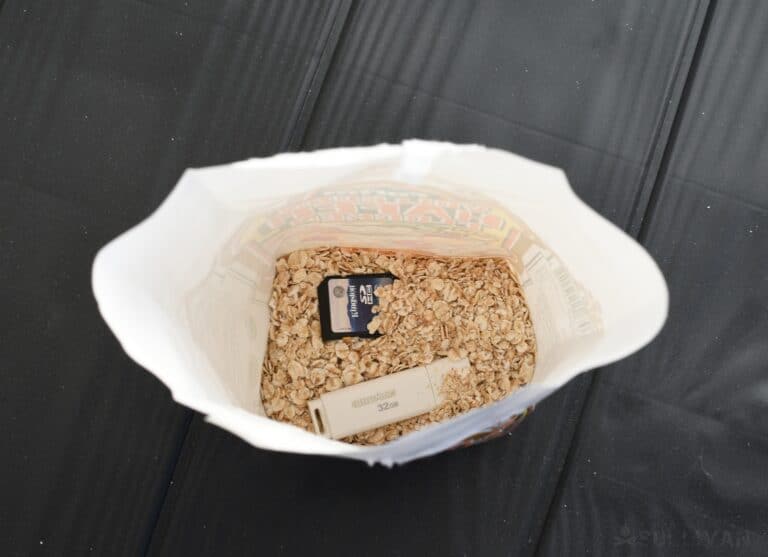
The biggest consideration with this type of diversion safe is to make sure that the labels are current production, not out of date, stupidly generic or some other gimmick. Remember fidelity…
Also, if you live with family or have plenty of company, you must be especially cautious that they do not innocently stumble across your stash while hunting for a snack or, worse, throw it away entirely!
Vent Safe Stash
This is a two-way option. You can purchase ready-made vent safes that look just like any other register in your home, but swing out or otherwise open up to reveal a compartment that holds your goods, or you can adapt your belongings to fit inside your actual, existing ductwork.
Alternately to both, you can use your real, matching vent hardware to create a false compartment that blends in with the rest of your home’s ventilation sources.
The trick with both is to locate them well. Too many vents too close to one another might raise suspicion, and you need to take care that all are placed according to the layout for the rest of the house.
There you have fidelity and location in action once again. This can be one of the better options for hiding a gun in a strategic place.
Caution should be taken if you hide anything in your actual ventilation ducts that the items are resistant to changes in temperature as well as moisture, and you must remember to retrieve them whenever you are having your ducts cleaned or otherwise serviced.
It would not do to have to explain the presence of a gun to a technician or find out that your valuables coincidentally disappeared from their hiding place after your vents were cleaned.
A Trick of the Light… Switch
A small but effortlessly concealable wall safe can be made from a box-stock light switch box, and plate.
You’ll need to chop up a functional switch to make the deception stick, but the total cost for such a setup is only a few dollars total, not including what you’ll need to install it.
If you are able to install a double, triple, or even wider bank of switches, so much the better.
The hardest part is simply finding a place to install it that makes sense from a home design and layout perspective and one that is not already occupied by a real switch!
Easier said than done, but this is possible near the front and back doors as plenty of homes have supplementary exterior light and gadget controls mounted there.
Once you install the light switch box, all you need to do is fasten the switches to the cover itself, not the box, and ideally do so in such a way that they still flip and click like normal.
Use the tabs where the plate normally screws and bolt them to the box as normal, as these are what your plate concealment will attach to. Then just screw the assembled plate onto the wall as usual. Voila!
If all that sounds a little too much like DIY mayhem and mishap in the making, you can purchase prefabricated units not too dissimilar to our register or vent model above.
These often flip out of the wall with little effort and contain a sort of bin to make accessing the contents easy and effortless. While less resistant to wandering or nefarious hands, the speed they afford might be worth it for some over the traditional do-it-yourself variant.
Power Strip Hideaway
While electronics of all kinds are often high-value easy-to-fence goods for crooks, the small gadgets we use to protect them from power surges are rarely if ever given any attention since they are effectively worth nothing.
This is where you can make use of one to protect your valuables in more than one way!
If you have an old one you can hollow out, the slender and long body of a power strip and hold a surprising amount of valuables, everything from jewelry and cash to documents and flash drives.
Once you have gutted your device, it is ready to be set beneath your entertainment console, office desk, or gaming console as just another artifact in the tangled web of consumer electronics that is always growing inside the modern home.
Alternatively, you can chuck it into a junk drawer, box or bag o’ cords that always seems to be lurking somewhere in the average American’s residence where it will be effectively invisible.
The only thing you must pay careful attention to mitigating is any rattling or noise coming from within once you have converted it, and checking to be sure that you cannot see into the body through the slots once you have ripped all the guts out.
Other than that, this is a simple and ingenious solution for smaller valuables you need to stash in plain sight. And speaking of electronics…
Monitor Mindgames
I’ll bet you $50 right now you have an old monitor or printer, or some other busted or obsolete piece of electronic kit or small appliance rolling around your house or in storage that, for whatever reason, you just cannot get rid of.
Well, the time has come: you can hang on to that old toaster without the guilt! All you need to do is open up the shell and, optionally, create a quick access port while removing much of the guts to make yourself a nice hiding spot.
You can get really creative here, and in the case of things like old tube monitors and TV’s you’ll have quite a lot of useable space, plenty for a handgun in almost every case.
Now, the most glaring potential pitfall in this setup is the nature of the diversion safe itself; I just got done saying above how valued electronics are to thieves, yeah?
That’s right, but in this case, you are going to give yourself an insurance policy by choosing only a horribly outdated model that no thief would waste the manpower on hoofing out of your house, or by choosing one that is obviously and dramatically broken- think cracked or shattered screen, broken casing, etc..
Set handily about in the right setting, like a workbench, storage room or computer “cave” this seeming piece of refuse will certainly be overlooked by all but the most relentlessly thorough or clever thieves.
Quick Access Shelf
A current hot trend for diversionary safes are floating shelves in a variety of styles that either use swing-away or fold-out storage compartments, most often accessed by a totally concealed magnetic key of nondescript appearance.
If you use these with a unified theme, color, and style throughout your home they can make for spacious and convenient stealthy storage.
When installing, make sure they are mounted according to manufacturer instructions, particularly if they will be concealing anything of significant weight, so you do not have to worry about them sagging.
These work best in clusters on a larger wall, but even a lone unit with a few knickknacks or (even better) a sacrificial item of minor value perched on it will go a long way toward keeping the contents hidden and safe.
This is another option that can be a good choice for concealing a firearm, especially since they often make use of discreet locking systems.
Note that barring a specialty unit that employs some type of hardened metal interior encased in a wooden shell, these units are not strongboxes. If attacked directly they will break with little effort and the jig will be up.
Potted Plant Protection
Real and fake plants alike furnish ample hiding places for industrious preppers, and your average pot can hold an ample amount of cash, a gun, or other similarly sized things completely out of sight and out of mind.
Larger pots can conceal all kinds of things.
You are only limited by your imagination when it comes to employing potted plants as hiding places: you could build a false bottom using a smaller pot set inside a larger one, set smaller items under the rebated bottom rim of some styles of pot, or even set the plant itself on top of your goodies inside the pot.
You’ll of course have to account for the type of plant in the pot and the type of goods you are storing. Real plants need water and food or else they’ll die, and that means tons of moisture.
If you go this route for an in-pot solution you’ll need to take the same weatherizing and sealing precautions you would if you were going to bury something in the ground.
Fake plants simply need to be able to lift in and out easily enough, and sit flush and level in the pot with your goods in place.
Take care that housekeepers, family members, and pets won’t get at the plant and possibly access or destroy the contents, especially if it is a gun you are hiding!
The Great Candle Caper
Large candles that are set about for decoration can make good safes for smaller items.
Set on a table, on a mantle, in a centerpiece, or anywhere else you’d expect to see one normally your candle will draw nary a glance. Hollowing out the bottom of wax candles is easily done using tools of all kinds.
Go slow and carefully and you should not warp or damage the exterior of the candle.
Once your cavity is sized to your liking, you can line the interior with plastic to create a vapor barrier, as scented candle oils might cause issues with absorbent materials or those vulnerable to rusting.
Another option for those who don’t mind spending a little more are the battery-powered flameless candles used for ambiance without the risk of burning your house down (or making it smell like cookie dough!).
These units already have a battery compartment underneath, and some even have a false “floor” in the body of the candle where the LED “wick” sits, making it prefabricated for your purposes.
A little rearranging of the battery compartment or internals may very well leave your candle fully functional; all the better for making it blend in!
The Classic Book Safe
An oldie but still a goodie, within reason. Book safes have been around for a long, long time, and due to that they are definitely a trope when it comes to hiding places.
This means that a savvy thief or just a nosy guest might suspect one, especially among a field of only a few or even no other books. To get good use from a book safe you’ll need to step your game up a little.
Book safes work best when hidden among a lot of other books. Their size also needs to be carefully chosen since larger books (which can hold more items) are often the first suspected as being hiding places.
This means you may want to use a small book like a trade paperback as a safe for cash, documents, or other small, light items instead of the classic pistol-in-the-giant-coffee-table-book that is overwhelmingly common.
Other tips include having a firm closure mechanism on the book to keep it from flopping open it swept off a shelf in a hurried search and making sure the spine of the book “fits” with its neighbors on the shelf.
Similar style, color, title, wear patterns etc. Remember: anything that draws attention is bad, and noticeable differences are attention-getting!
Larger books like old-school dictionaries work great for the purpose, along with dusty, old encyclopedias. Again, whatever you choose, make sure it looks at least passably like part of a curated collection on the shelf.
Some edgy types still like to hollow out a Bible or other holy book for the purpose under the misguided idea that a sacrosanct volume will somehow prove proof against honest snoops and thieves alike.
This is not true, generally, and I am against such practices at any rate.
Some clever preppers go the extra mile by crafting a book safe to fit around a genuine lockbox or other container that has a keyed locking mechanism or accepts a combination lock.
This is one of the best possible diversion safes since it combines the benefits of genuine safes with the discreet nature of a diversion safe.
If you’re feeling especially industrious and would like to take your hiding game up a notch, that is one of the more elaborate diversion safes that can be made.
A simpler one is to simply remove the spine and covers of a large book before setting it up around your lockbox. It should work like a hunter’s blind, but for your safe!
Fake Rock Rip-off
For outdoor hiding places, a false rock with a hidden compartment makes a great stash for a spare key or anything of a sensitive nature you don’t want falling into the wrong hands.
This is another classic maneuver and one that is fairly well-known to thieves. Folks usually have their rock-safe compromise for not skillfully incorporating – you guessed it- fidelity and location.
A sizeable stone placed smack in the middle of a bed of mulch with no other rocks around is going to stick out like a sore thumb. It will only fool the naïve and the good.
To make a rock safe truly invisible, it needs to be hidden among a field of similar rocks, or a landscape that incorporates plenty of stone elements. Color, shape, and shine are another set of criteria that can really betray the safe for what it is.
I have seen many of these units come from the factory with a glossy sealer that is startlingly obvious beside a genuine rock.
Worse, some people take these out of the package, load them and then chuck them outside to wherever they decided to locate them. Ever seen a clean rock? Didn’t think so.
Depending on your rock safe’s construction and finishing, it might need weathering or painting to help it blend in with its fellow legitimate rocks.
Some cheaper units tend to bleach out with continual sun and weather exposure so have a plan for keeping it “camo’d” or upgrade to a superior unit that does not require quite so much maintenance.
Sprinkler Sneakiness
A close cousin to the fake rock above, if your yard supports an in-ground sprinkler system you can make use of this clever diversion safe for outdoor storage, and this makes one that is very hard to discern and reasonably waterproof.
All you need to do is get one extra sprinkler head and body that matches your system’s existing units, hollow it out, and figure out some way to seal it, assuming it does not seal itself.
There are even purpose-made decoy sprinkler heads that are ready to use in this capacity.
You’ll need to do two things to properly employ this little gem. One, make sure it is planted in an out-of-the-way place. Plenty of pro thieves are very savvy to all kinds of tricks, traps, and hiding places.
Should they be casing your place and notice a sprinkler head that does not pop up or activate with the rest of the system, they may key on it.
Additionally, it is best if you can access it without being seen or observed by your neighbors, dog walkers, and any other passersby.
Second, it needs to be planted in a logical place, increasing its fidelity, or realism, an important concept in deception. A sprinkler head right up next to your house, or on the corner with hardly any grass or beds will stick out to the clever and observant miscreants out there.
Got more Clever Ideas?
Use of diversion safes as part of a greater plan to keep your prepping supplies, and valuables safe is a great idea so long as you pay careful attention to setting them up for best results.
By working hard to maximize fidelity and precisely locating them most burglars will breeze right by without suspecting a thing.
Use the list of diversion safes above and place them appropriately in your home or use them as inspiration to come up with your own variation.
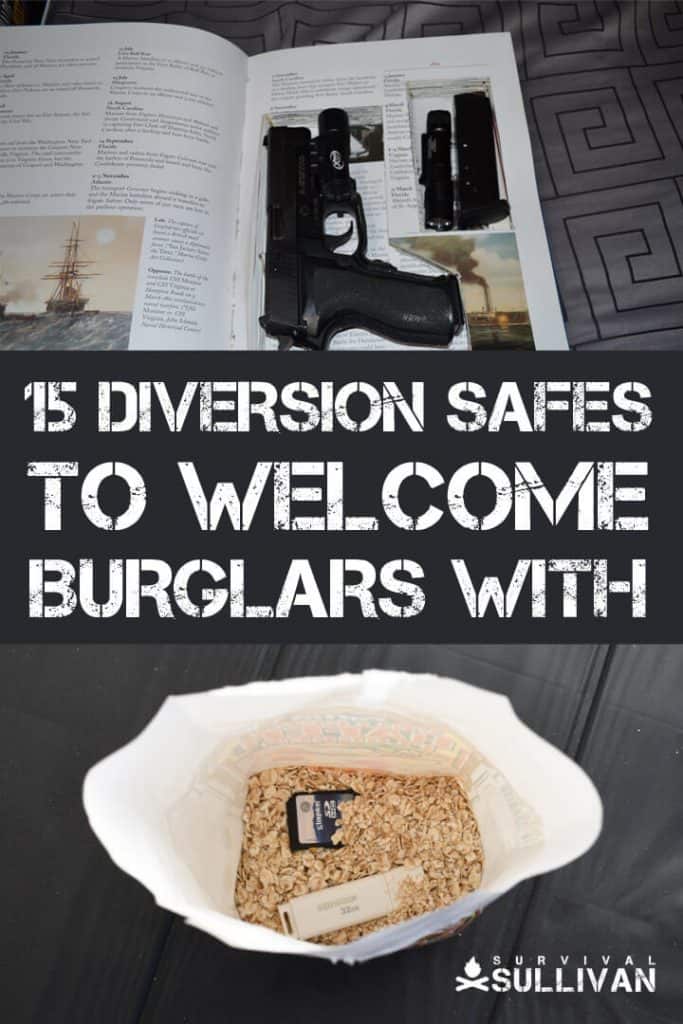
updated 03/16/2022

Charles Yor is an advocate of low-profile preparation, readiness as a virtue and avoiding trouble before it starts. He has enjoyed a long career in personal security implementation throughout the lower 48 of the United States.
